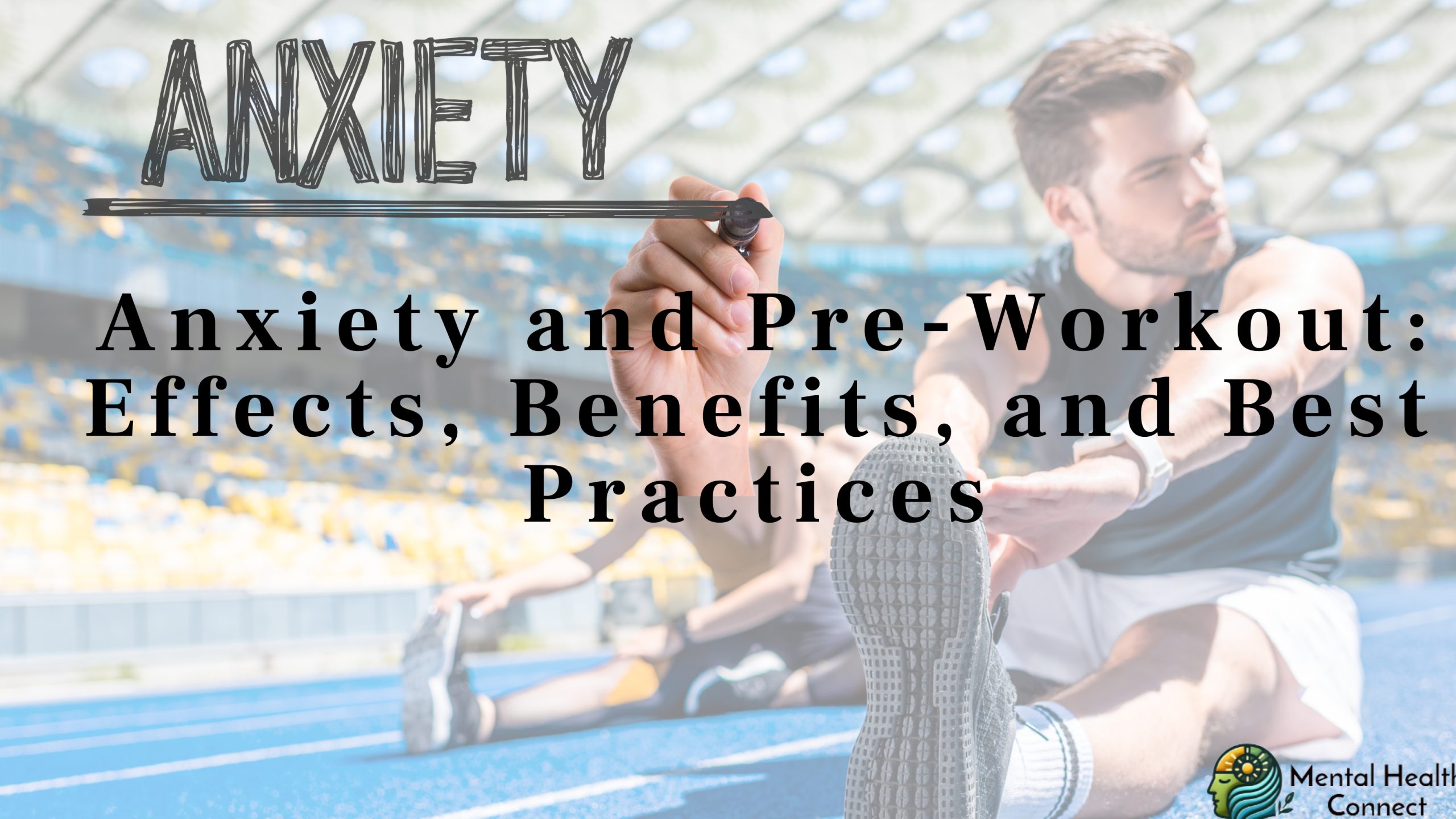Anxiety and Pre-Workout: Effects, Benefits, and Best Practices

Pre-workout supplements are popular among fitness enthusiasts looking to enhance performance, boost energy, and maximize workout efficiency. However, individuals prone to anxiety may experience unwanted side effects due to stimulants commonly found in pre-workouts. Understanding the link between anxiety and pre-workout supplements can help users make informed choices and optimize their fitness regimen without triggering anxiety symptoms. In this article, we’ll explore the effects of pre-workout on anxiety, provide best practices, and offer alternatives for those sensitive to stimulants.
What is Pre-Workout?

Pre-workout refers to dietary supplements designed to improve exercise performance. These supplements typically contain a blend of ingredients such as caffeine, beta-alanine, creatine, and nitric oxide precursors to enhance endurance, focus, and strength.
Common Ingredients in Pre-Workout:
- Caffeine – A stimulant that boosts alertness but may cause anxiety in high doses.
- Beta-Alanine – Helps reduce muscle fatigue but may cause tingling sensations.
- Creatine – Supports muscle strength and recovery.
- L-Citrulline – Enhances blood flow for improved endurance.
- B Vitamins – Aid in energy metabolism.
While these ingredients can be beneficial for workouts, they may also contribute to anxiety symptoms, especially in individuals sensitive to stimulants.
Why is Understanding Anxiety and Pre-Workout Important?
For those with anxiety disorders or high stress levels, pre-workout supplements can be a double-edged sword. The stimulants in pre-workout can exacerbate symptoms of anxiety, leading to jitters, rapid heart rate, and restlessness. Understanding the interaction between these supplements and mental health is crucial to avoid unwanted side effects and ensure a positive workout experience.
Key Benefits of the Right Pre-Workout Choice:
- Improved focus and motivation – The right balance of ingredients can enhance concentration.
- Increased endurance – Certain amino acids and nitric oxide boosters help sustain longer workouts.
- Enhanced energy levels – A properly dosed supplement can prevent mid-workout fatigue.
- Reduced risk of anxiety triggers – Choosing stimulant-free options can prevent nervousness and rapid heart rate.
How to Use Pre-Workout Safely Without Triggering Anxiety
If you have anxiety and still want the benefits of pre-workout, consider these practical steps:
1. Choose a Low-Stimulant or Stimulant-Free Pre-Workout
- Look for caffeine-free or low-caffeine options.
- Opt for natural energy boosters like green tea extract or BCAAs.
- Check labels for hidden stimulants like yohimbine or synephrine, which may worsen anxiety.
2. Time Your Intake Wisely
- Avoid consuming pre-workout too close to bedtime to prevent sleep disturbances.
- Consider smaller doses or splitting the serving to assess tolerance.
- Pair pre-workout with a meal to slow down absorption and reduce jitters.
3. Monitor Your Caffeine Intake
- The average pre-workout contains 150-300mg of caffeine, which may be too much for those sensitive to stimulants.
- Compare your total daily caffeine consumption (including coffee, tea, energy drinks, etc.).
- If anxiety increases post-consumption, switch to a non-stimulant pre-workout.
4. Stay Hydrated
- Dehydration can exacerbate pre-workout side effects, including headaches and dizziness.
- Drink at least 8-10 glasses of water daily, especially if taking pre-workout.
5. Incorporate Relaxation Techniques
- Deep breathing exercises, meditation, and progressive muscle relaxation can help counteract stimulant-induced anxiety.
- Engaging in a cool-down routine post-workout can lower cortisol levels.
Best Practices for Managing Anxiety and Pre-Workout Use

To maximize benefits while minimizing risks, follow these expert-recommended best practices:
- Start with a half dose – Gradually assess your body’s response before increasing the amount.
- Opt for natural alternatives – Consider beetroot juice, green tea, or coconut water as pre-workout energizers.
- Read ingredient labels carefully – Avoid products with excessive artificial additives and unregulated substances.
- Consult a healthcare professional – If you have an anxiety disorder, seek guidance before introducing new supplements.
Common Mistakes & How to Avoid Them

Mistake 1: Ignoring Caffeine Sensitivity
- Solution: Choose low-caffeine or stimulant-free pre-workout options.
Mistake 2: Taking Pre-Workout on an Empty Stomach
- Solution: Have a light snack before consumption to minimize potential side effects.
Mistake 3: Overusing Pre-Workout
- Solution: Limit intake to 3-4 times per week to prevent dependency and tolerance buildup.
Mistake 4: Not Checking for Hidden Stimulants
- Solution: Research ingredient lists and opt for well-researched brands.
Mistake 5: Skipping Hydration
- Solution: Increase water intake to avoid dehydration-related anxiety symptoms.
Future Trends & Predictions
As more people become health-conscious, the fitness industry is evolving to provide anxiety-friendly supplements. The future of pre-workout may include:
- More stimulant-free formulas catering to individuals with anxiety.
- Advanced nootropics to enhance focus without overstimulating the nervous system.
- Personalized pre-workout supplements tailored to individual tolerance levels.
- AI-driven supplement recommendations based on biometric data and mental health considerations.
FAQs
1. Can pre-workout make anxiety worse?
Yes, certain ingredients like caffeine and yohimbine can increase heart rate and restlessness, which may exacerbate anxiety symptoms.
2. What are the best stimulant-free pre-workout options?
Look for formulas containing L-citrulline, BCAAs, creatine, and electrolytes without caffeine.
3. How much caffeine is too much for someone with anxiety?
For individuals with anxiety, limiting caffeine intake to 100mg or less per serving is ideal to prevent overstimulation.
4. Are there natural alternatives to pre-workout for anxiety sufferers?
Yes! Bananas, dark chocolate, green tea, and beetroot juice provide energy and performance benefits without high stimulants.
5. Can I take pre-workout if I have an anxiety disorder?
It depends on individual tolerance. It’s best to consult a healthcare professional and opt for low-stimulant or stimulant-free pre-workout supplements.
6. How can I reduce pre-workout jitters?
To prevent jitters, start with a lower dose, eat a balanced meal, and stay hydrated.
7. Is pre-workout safe for everyone?
Not necessarily. People with heart conditions, high blood pressure, or anxiety disorders should be cautious when using pre-workout supplements.Pre-workout supplements can be a great tool for improving exercise performance, but they may pose challenges for individuals prone to anxiety. Choosing a low-stimulant or stimulant-free pre-workout, staying hydrated, and managing caffeine intake can help reduce the risk of anxiety-related side effects.
-
 How to Support Someone with OCDApril 17, 2025
How to Support Someone with OCDApril 17, 2025 -


Leave a Reply